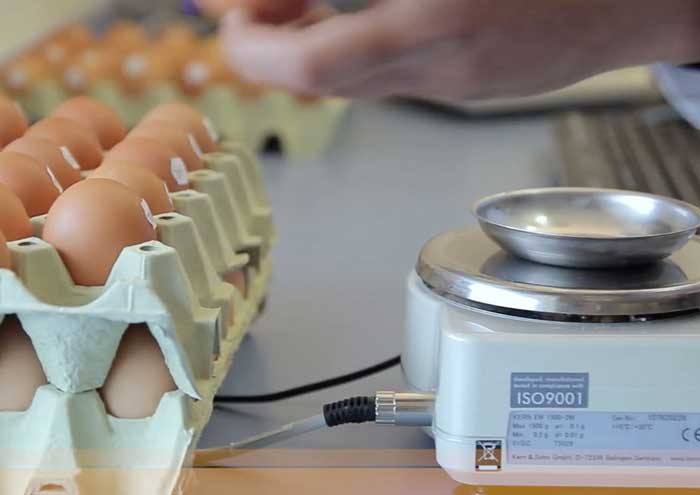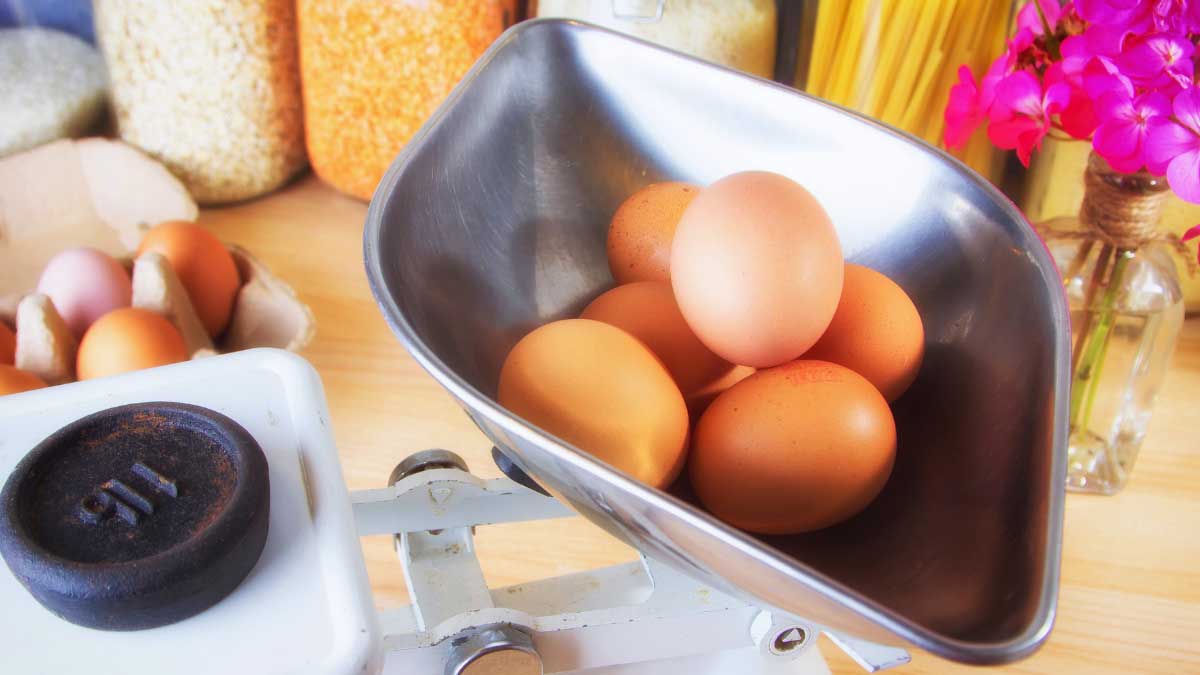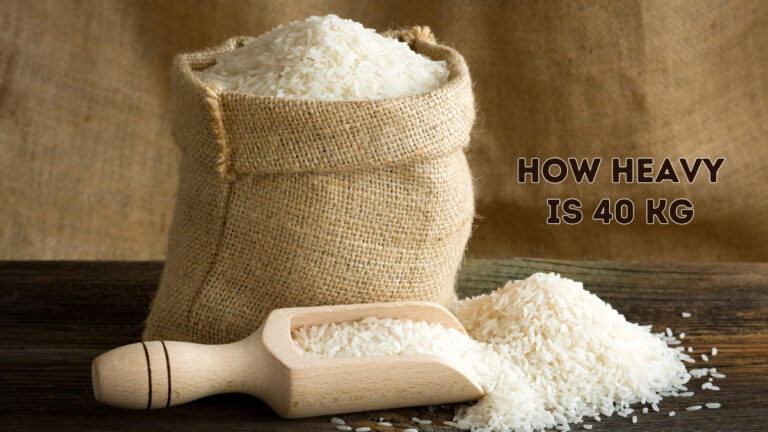How Much Does an Egg Weigh: A Guide to Egg Sizes & Weights
If you’ve ever cracked an egg into a mixing bowl and wondered about its weight, you’re not alone. Understanding the weight of an egg can be crucial, especially if you’re a culinary enthusiast or watching your calorie intake. Eggs come in various sizes, from small to jumbo, each with its own weight class. For instance, a large egg typically weighs around 2 ounces (57 grams), while a jumbo egg can tip the scales at a hefty 2.5 ounces (71 grams).
Knowing the weight of eggs isn’t just about satisfying curiosity; it can make a significant difference in your cooking and baking results. Recipes often call for specific egg sizes, and using the wrong one could lead to a dish that’s too moist or dense. So, whether you’re a seasoned chef or a home cook, understanding the weight of an egg can be the key to culinary success.
Key Takeaways
- Understanding Egg Weight: Eggs come in various sizes, from peewee to jumbo, each with specific weight ranges that can impact cooking and baking results significantly.
- Common Egg Sizes: Large eggs are standard at about 2 ounces (57 grams), with the entire range spanning peewee up to jumbo, which can weigh over 2.5 ounces (71 grams).
- Factors Affecting Egg Size: Genetics, the hen’s age, and environmental conditions greatly influence egg weight and size, affecting their use in recipes.
- Egg Components: An egg’s shell, yolk, and egg white each have distinct weights contributing to the total egg weight, crucial for precise culinary applications.
- Conversion and Substitution: Knowing how to convert and substitute between different egg sizes ensures consistency in recipes, maintaining balance in taste and texture.
- Measuring Eggs: Accurate measurement in ounces or cups is vital in recipes to obtain consistent cooking and baking outcomes, especially in dishes requiring precision like soufflés and meringues.
Understanding Egg Weight and Size
Egg size and weight can significantly impact your cooking results. Choosing the right egg size is essential if you’re following a specific recipe or managing dietary goals.

Common Egg Sizes: From Peewee to Jumbo
Eggs come in six sizes, each with distinct weight ranges.
- Peewee: These are the smallest, weighing under 43 grams (about 1.5 ounces). They’re often laid by young hens, making them less common.
- Small: Weigh between 43 and 49 grams (about 1.5 to 1.7 ounces). Small eggs are typically from hens at the start of their laying cycle.
- Medium: Weigh 49 to 55 grams (approximately 1.7 to 1.9 ounces). Medium eggs are a common sight in grocery stores and straightforward to use in recipes.
- Large: Weigh 55 to 64 grams (about 1.9 to 2.3 ounces). For most recipes, large eggs are the standard due to their availability and size.
- Extra Large: Weigh between 64 and 71 grams (roughly 2.3 to 2.5 ounces). Their larger volume makes them suited for baking.
- Jumbo: These are the largest, starting at 71 grams (about 2.5 ounces or more). They are fewer in number but useful for hearty dishes.
Egg Weight Variations
Several factors cause eggs to vary in weight. Genetics plays a significant role, accounting for about 40% of the variation. The breed and age of hens, as well as their diet and living conditions, also contribute to differences in egg weight.
Comparative weights per dozen provide insights if you’re considering bulk usage:
| Egg Size | Weight per Dozen (oz) | Weight per Dozen (g) |
|---|---|---|
| Peewee | 15 | 425 |
| Small | 18 | 510 |
| Medium | 21 | 595 |
| Large | 24 | 680 |
| Extra Large | 27 | 765 |
| Jumbo | 30 | 851 |
In the kitchen, precision with egg weight ensures your recipes turn out consistently whether you’re baking a cake or preparing an omelet.
How Egg Sizes Are Determined
Egg sizes are determined by weight, not volume. This principle ensures consistency, though visual size variations may occur. Here’s how weights categorize different egg sizes.
Factors Affecting Egg Size
- Genetics: Approximately 40% of egg size variation comes from genetics. Specific breeds influence egg weight. For instance, larger breeds like Jersey Giants, Orpingtons, and Cochins often lay bigger eggs.
- Hen’s Age: Younger hens may lay on the size extremes, from peewee to jumbo. In their prime, hens usually produce medium or large eggs consistently.
- Environment: Lighting, diet, and season impact egg size. A well-regulated environment leads to consistent egg sizes.
Egg Size Standards and Grades
In the U.S., the USDA sets egg size standards by weight for one dozen eggs:
| Egg Size | Weight per Dozen (ounces) | Weight per Egg (grams) |
|---|---|---|
| Jumbo | 30 or more | 70.9 or more |
| Extra Large | 27 to 29 | 63.5 to 65.7 |
| Large | 24 to 26 | 56.7 to 59.5 |
| Medium | 21 to 23 | 49.6 to 52.6 |
| Small | 18 to 20 | 42.5 to 45.4 |
| Peewee | 15 to 17 | 34.0 to 38.6 |
These standards allow you to choose the right egg size confidently, whether baking a cake or crafting an omelet.
Egg Components and Their Weight
When considering the weight of an egg, it’s essential to break it down into its components: the shell, yolk, and egg white. Each part contributes differently to the total weight of the egg.
Shell Weight
The eggshell, a protective layer for the contents inside, typically accounts for about 12% of a large egg’s total weight. This means that for large eggs weighing between 50-55 grams, the shell weighs approximately 6-6.6 grams. Understanding shell weight is crucial, especially if you plan to use eggshells as calcium supplements or need precise measurements for culinary purposes.
Yolk Weight
The yolk is nutrient-rich and generally represents about 30-33% of a large egg’s weight. With a large egg yolk weighing around 17-18 grams, this part of the egg is significant for its high cholesterol content, making it vital to measure accurately for recipes, especially in baking where yolks and whites are often separated. For example, pastry chefs may require precise yolk weight to balance flavors and textures in custards.
Egg White Weight
The egg white, or albumen, constitutes the remaining 50-55% of the egg’s weight. In a large egg, the egg white typically weighs around 27-30 grams. Its high protein content makes it valuable for both culinary and nutritional purposes. Precise measurements ensure consistency in recipes such as meringues and soufflés, where the texture of the egg white is critical.
By understanding each component’s weight, you can achieve better precision in cooking, baking, and nutritional planning, ensuring consistent results in all your culinary endeavors.
Converting Egg Sizes for Recipes
Understanding how to convert egg sizes ensures your culinary creations maintain texture and consistency. When substitution is necessary, knowing the equivalents between various egg sizes prevents deviations in recipe outcomes.
Using an Egg Size Chart
An egg size chart can help you adjust quantities across different egg sizes when specific sizes aren’t available.
- 1 Large Egg: Substitute with 1 medium or 1 extra-large egg.
- 2 Large Eggs: Use 2 medium, 3 small, or 2 jumbo eggs.
- 3 Large Eggs: Replace with 4 medium, 4 small, or 3 extra-large eggs.
Use this chart to maintain balance in your recipes. Accurate substitution is crucial for complex dishes like soufflés.
Measurements in Ounces and Cups
Understanding egg weight in ounces or the volume in cups aids precise conversions. For instance:
- 1 Large Egg: Weighs about 2 ounces or occupies 1/4 cup.
- Egg Whites from 1 Large Egg: Weigh approximately 1 ounce or 2 tablespoons.
- Yolk from 1 Large Egg: Typically 0.67 ounces or 1 tablespoon.
These measurements ensure precision in baking, where exact proportions affect the final product’s rise and texture. By weighing your eggs, you minimize variations, offering a foolproof way to perfect your results in the kitchen.
Conclusion
Understanding the weight of eggs is a key factor in culinary success. Whether you’re baking a cake or crafting an omelet, knowing the precise weight of the eggs you use ensures consistency and quality in your dishes. The various sizes, from peewee to jumbo, offer a range of weights that can significantly impact your recipes. By familiarizing yourself with these details, you can make informed decisions in the kitchen, leading to better texture, moisture, and overall results. Keep this knowledge handy as you experiment and enjoy the art of cooking with confidence and precision.







